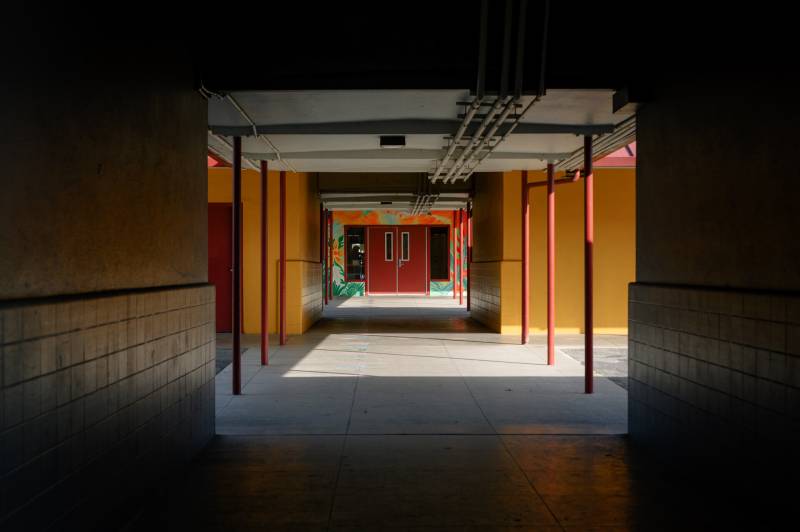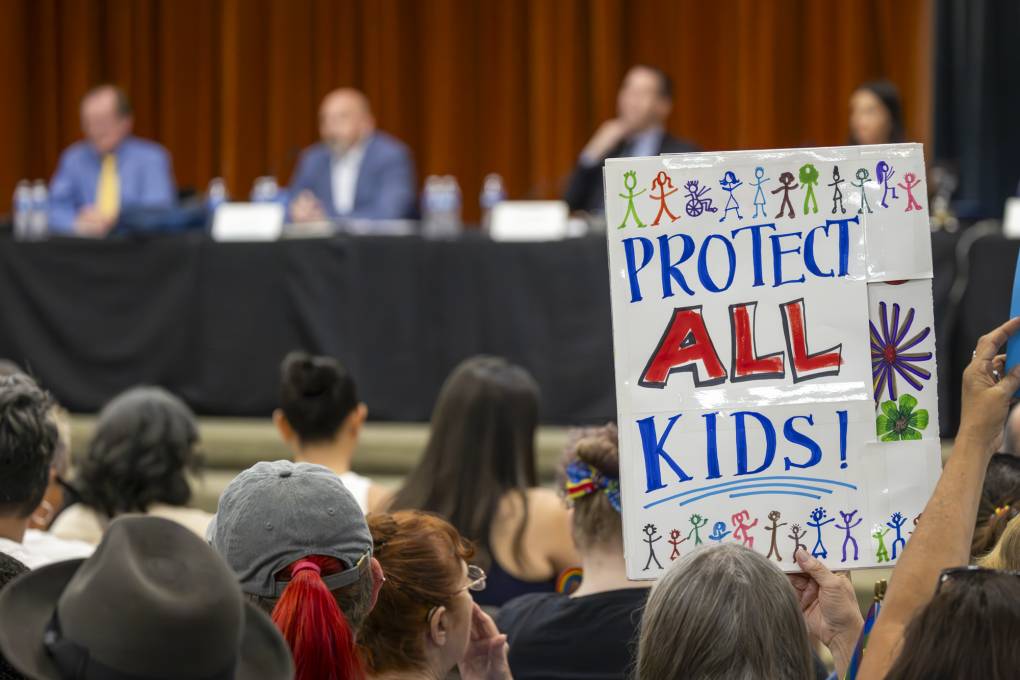Pegram told KQED his group is not involved in politics. But at the August church meeting for prospective school board candidates, Pegram offered extensive guidance to candidates about campaigning, fundraising and messaging, saying, “If you want to see a change in curriculum in the schools, you have to make a change in the face of the people that are running the district.”
“Our organization, Informed Parents of Silicon Valley, is dedicated to helping you candidates get elected,” Pegram said before adding, “Now, we’re a 501(c)(3) organization. We don’t — I’m doing this for the tape — we do not endorse any candidates.”
Pegram said his group’s distribution of the “opt-out bookmarks” will encourage like-minded parents to form organizations.
“If we can create parent organizations at the various school districts, we’ve got the army. So that when someone stands up and says, ‘Yes, I want to run,’ we’ve got an army … and we can begin to use that army for all of the labor needs that occur in a political campaign,” he added.
Critics of Informed Parents see the group as Pegram’s latest effort to target LGBTQ+ rights in the South Bay.
Yeager, who detailed the history of local LGBTQ+ politics in his book Run!, recounted Pegram’s opposition to ordinances protecting the city’s gay residents from discrimination in 1980. Later, Pegram was a local advocate for Proposition 8, which banned gay marriage statewide in 2008.
“The focus is always on children,” Yeager said. “But obviously, their main aim is really to sort of take over politics and to sort of deprive LGBTQ people of the same rights as everybody else.”
Pegram maintained that his own political history is “irrelevant” to the current work of Informed Parents.
Dr. Melissa Michelson, a political science professor at Menlo College, said she sees a similar playbook at work in the current debates playing out over LGBTQ+ issues in schools.
“The culture wars are all about finding that new thing that divides and tries to, you know, to pull away from the opposition’s coalition. And so maybe 10, 15 years ago, it was marriage equality,” said Michelson, who studies LGBTQ+ politics and transgender rights. “And now the focus has turned to what’s going on in schools, what’s going on in school libraries, what’s going on in school curriculums.”
Michelson said school board elections present a unique opportunity for small groups of well-organized activists. The races are often low-information contests, and candidates don’t run as a member of a political party, leaving voters without a partisan cue.
It’s also a strategic move in a blue state like California, where anti-LGBTQ+ legislation is unlikely to succeed at the state level. Instead, California’s Republican Party has made a concerted effort to invest in school board candidates as a way of building political power at the local level.
Last year, the Silicon Valley Association of Republican Women supported more than a dozen candidates for school board across Santa Clara County.
Four of those candidates won: Marc Cooper in the Franklin-McKinley School District; Pamela Gardiner in the Morgan Hill Unified School District; Jim Zito in the Evergreen School District; and Linda Chavez, in her bid for reelection in the Alum Rock Union Elementary School District.
But their ties to conservative parents’ rights groups have created divisions at the local level. Cooper was censured last month by his board colleagues for appearing on a flier promoting his presence at an event organized by Informed Parents. The group was forced to apologize to San José councilmember Bien Doan for featuring his image on the same flier without his knowledge.
Tensions were already high leading into Tuesday’s council meeting. The resolution had initially called for the explicit condemnation of Informed Parents and accused the group of harassing families in their attempts to distribute opt-out literature. But after legal threats from the group, Informed Parents’ name was removed from the legislation.
At the meeting, about two dozen residents showed up to testify — many sharing personal experiences.
Sandra Rivera, a teacher and president of the teachers union in Alum Rock, told the council about raising a transgender son in local schools.
“As my son navigated who he was, it was through educators here in San José and in safe spaces created by them that helped him feel safe exploring his gender,” Rivera said. “Groups such as Informed Parents of Silicon Valley are wolves in sheep’s clothing trying to justify hate.”

